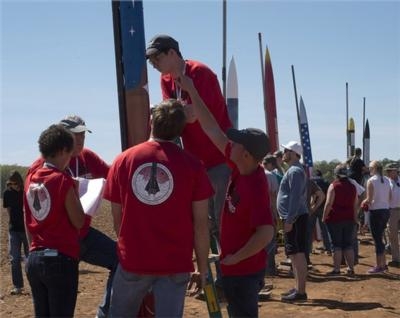Louisville, KY Team Takes Top Honors For The First Time
For the first time in four years, a new team has won NASA's Student Launch, the agency's high-powered rocketry challenge, hosted by and held near NASA's Marshall Space Flight Center in Huntsville, Alabama, April 5-8. The River City Rocketry team from the University of Louisville, in Louisville, Kentucky, captured top honors. They've proven hard work and determination pays off, literally, taking home a cash prize of $5,000, offered by Orbital ATK of Promontory, Utah, longtime corporate sponsor of the challenge. No stranger to success, this team from the bluegrass state placed second last year. Since 2011, they've earned 10 awards, including Best Vehicle Design, Safety Award, Project Award and more.

In second place, after a record-setting "four-peat" as champions, is Vanderbilt University in Nashville, Tennessee. They earned a cash prize of $2,500, offered by new sponsor, the National Space Club – Huntsville. For 10 straight years, Vanderbilt soared to success with innovative rocket designs and payloads, and this year was no exception. Having earned more than 20 awards the past decade, the Commodores of Vanderbilt added the 2017 Payload Design, Rocket Fair Display and Education Engagement awards.
Rounding out the top five is Cornell University of Ithaca, in New York; the University of Alabama in Huntsville; and the University of North Carolina, Charlotte, in third through fifth place, respectively. The 2017 Rookie of the Year award goes to the University of Evansville, in Evansville, Indiana.
Cornell University, having placed third in back-to-back years, also cracked the top five in 2015, making them a perennial power. The same is true for the University of North Carolina, Charlotte, earning top five finishes in both 2017 and 2015.
While veteran teams prove consistent participation in Student launch helps – especially since this year's top three teams repeated (though, in a different order) – the novice and rookie teams continue to excel. For example, the University of Huntsville – Alabama team was made up of all-rookie members, yet launched their way to fourth place.
Finishing first may be fun, but it's not the most important aspect. Student Launch is a real-world outlet for young people to apply lessons learned in class toward relevant and cost-effective research into propulsion and recovery systems.
Nearly 50 student teams from middle and high schools, colleges and universities in 22 states demonstrated advanced rocketry and engineering skills. Teams spent eight months building and testing rockets designed to fly to an altitude of one mile, deploy an automated parachute system, and safely land for reuse, each carrying a scientific payload for data collection during flight.
"It's exciting to see team designs and enable them to conduct meaningful research into NASA's journey to Mars and beyond," said Katie Wallace of Marshall's Academic Affairs Office. "Working through the NASA design process, students gain a broader understanding of current projects, like the Space Launch System, NASA's next deep-space exploration rocket."
On April 8, preliminary awards for additional achievements such as best vehicle design, safety, best team website and more were announced during an awards ceremony at the U.S. Space & Rocket Center in Huntsville, hosted by Orbital ATK. View the full list of preliminary award winners here.
The Academic Affairs Office at Marshall manages Student Launch to further NASA's education goal of attracting and encouraging students to pursue degrees and careers in the STEM fields of science, technology, engineering and mathematics. NASA's Office of Education and Human Exploration and Operations Mission Directorate, as well as Orbital ATK's Propulsion Systems Division and the National Space Club - Huntsville, provide funding and leadership.
As the high-pitched whistle of rocket launches have faded, next year's teams are on deck, ready to solve thrust-to-weight ratios and kinetic energy predictions. After all, it IS rocket science.
(Image provided with NASA news release)
 ANN's Daily Aero-Linx (05.06.25)
ANN's Daily Aero-Linx (05.06.25) ANN's Daily Aero-Term (05.06.25): Ultrahigh Frequency (UHF)
ANN's Daily Aero-Term (05.06.25): Ultrahigh Frequency (UHF) ANN FAQ: Q&A 101
ANN FAQ: Q&A 101 Classic Aero-TV: Virtual Reality Painting--PPG Leverages Technology for Training
Classic Aero-TV: Virtual Reality Painting--PPG Leverages Technology for Training Airborne 05.02.25: Joby Crewed Milestone, Diamond Club, Canadian Pilot Insurance
Airborne 05.02.25: Joby Crewed Milestone, Diamond Club, Canadian Pilot Insurance



